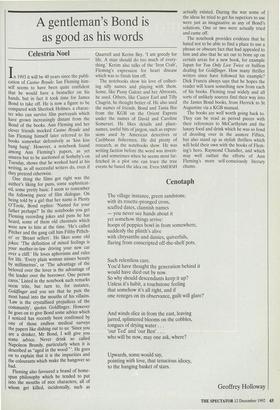A gentleman's Bond is as good as his words
Celestria Noel
In 1993 it will be 40 years since the publi- cation of Casino Royale. Ian Fleming him- self seems to have been quite confident that he would have a bestseller on his hands, but in fact it took time for James Bond to take off. He is now a figure to be compared with Sherlock Holmes, a charac- ter who can survive film portrayals which have grown increasingly distant from the Bond of the books. Ann Fleming and her clever friends mocked Casino Royale and Ian Fleming himself later referred to his books somewhat defensively as 'kiss kiss bang bang'. However, a notebook found among Ann Fleming's papers, as yet unseen but to be auctioned at Sotheby's on Tuesday, shows that he worked hard at his writing, as all successful writers do, even if they pretend otherwise. One thing the films got right was the author's liking for puns, some sophisticat- ed, some pretty basic. I seem to remember the following piece of film dialogue. On being told by a girl that her name is Plenty O'Toole, Bond replies: 'Named for your father perhaps?' In the notebooks you get Fleming recording jokes and puns he has heard, some of them old chestnuts which were new to him at the time. 'He's called Pitcher and the gang call him Filthy Pithch- er' or 'Breast sellers'. He likes some old jokes: 'The definition of mixed feelings is your mother-in-law driving your new car over a cliff.' He loves aphorisms and rules for life. 'Every plain woman misses beauty by millimetres', or 'The advantage of the beloved over the lover is the advantage of the lender over the borrower. One person cares.' Listed in the notebook such remarks seem trite, but turn to, for instance, Goldfinger and you see that he puts the most banal into the mouths of his villains. `Law is the crystallised prejudices of the community', quotes Goldfinger. However he goes on to give Bond some advice which I noticed has recently been confirmed by one of those endless medical surveys the papers like dishing out to us: 'Since you are a drinker, Mr Bond, I will give you some advice. Never drink so called Napoleon Brandy, particularly when it is described as "aged in the wood " '. He goes on to explain that it is the impurities and the colourants which make the hangover so bad.
Fleming also favoured a brand of home- spun philosophy which he tended to put into the mouths of nice characters, all of whom get killed, incidentally, such as Quarrell and Kerim Bey. 'I am greedy for life. A man should do too much of every- thing.' Kerim also talks of the 'Iron Crab', Fleming's expression for heart disease which was to finish him off.
The notebooks show his love of collect- ing silly names and playing with them. Some, like Pussy Galore and her Abrocats, he used. Others, like Castor Earl and Tilly Chagrin, he thought better of. He also used the names of friends. Bond and Tania flee from the KGB on the Orient Express under the names of David and Caroline Somerset. He likes details and place- names, useful bits of jargon, such as expres- sions used by American detectives or Caribbean fishermen. He did plenty of research, as the notebooks show. He was writing faction before the word was invent- ed and sometimes when he seems most far- fetched in a plot one can trace the true events he based the idea on. Even SMERSH
actually existed. During the war some of the ideas he tried to get his superiors to use were just as imaginative as any of Bond's solutions. One or two were actually tried and came off.
The notebook provides evidence that he hated not to be able to find a place to use a phrase or obscure fact that had appealed to him and also that he set out to bone up on certain areas for a new book, for example Japan for You Only Live Twice or bullion dealing for Goldfinger. How many thriller writers since have followed his example? Dick Francis always says that he hopes the reader will learn something new from each of his books. Fleming read widely and all sorts of unlikely sources find their way into the James Bond books, from Herrick to St Augustine via a KGB manual.
The books are well worth going back to. They can be read as period pieces with their references to McCarthyism and the luxury food and drink which he was so fond of drooling over in the austere Fifties, but also stand up as stylish thrillers which will hold their own with the books of Flem- ing's hero, Raymond Chandler, and which may well outlast the efforts of Ann Fleming's more self-consciously literary chums.
Cenotaph
The village instance, green sandstone, with its rosette-pronged cross, scuffed dates, clannish names — you never see hands about it yet somehow things arrive: hoops of poppies bowl in from somewhere, suddenly the plinth's alive with chrysanths and daisies, quiverfuls, flaring from conscripted off-the-shelf pots.
Such relentless care.
You'd have thought the generation behind it would have died out by now.
So why should descendants keep it up?
Unless it's habit, a touchstone feeling that somehow it's all right, and if one reneges on its observance, guilt will glare?
And winds slice in from the east, leaving jarred, splintered blooms on the cobbles, tongues of drying water . . .
`our Ted' and 'our Ben' . . .
who will be now, may one ask, where?
Upwards, some would say, pointing with love, that tenacious idiocy, to the hanging basket of stars.
Geoffrey Holloway


































































 Previous page
Previous page